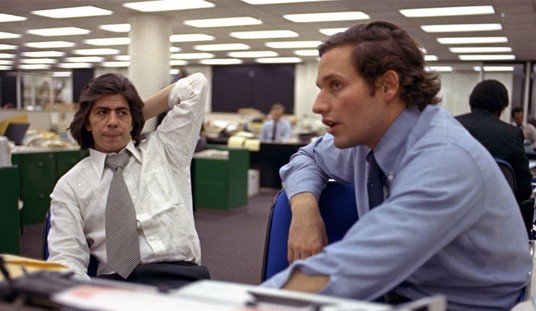Will the US get to try Julian Assange? At least we’ve finally gotten in line, and not a moment too soon. As a deadline for an extradition request loomed, the Trump administration finally filed its formal paperwork with the United Kingdom to gave Assange sent here for trial:
The United States has submitted its formal request to the United Kingdom to extradite WikiLeaks founder Julian Assange, according to a US official with knowledge of the matter.
Assange was arrested in April at the Ecuadorian Embassy in London and the US had roughly 65 days — or until mid-June — to send in full extradition papers.
Prosecutors initially charged Assange with a single count of computer intrusion, but last month added 17 new counts, including controversial charges under the Espionage Act for encouraging, receiving and publishing national defense information in concert with former Army intelligence analyst Chelsea Manning.
That indictment had to get filed before submitting the extradition request, the Washington Post explained last night. Otherwise, the treaty between the US and the UK would have prohibited any further charges from being added. That means Assange won’t have to wonder what else American prosecutors might have up their sleeves.
For instance, it appears that Assange won’t play a role in another high-profile case involving Wikileaks:
The same treaty bars the United States from prosecuting Assange for any alleged crimes beyond those outlined in the extradition request, unless those acts occur after his extradition. In an 18-count indictment filed last month, prosecutors charged Assange with violating the Espionage Act and conspiring to hack into a government computer.
The Justice Department did not pursue Assange for the 2017 exposure of Central Intelligence Agency hacking tools known as “Vault 7,” according to government officials, out of concern that doing so would do more damage to national security. Joshua Adam Schulte, a former CIA employee, is accused in New York federal court of leaking that information to WikiLeaks.
That probably won’t help Chelsea Manning in getting out of jail. Manning refuses to testify to the grand jury issued the broader indictment on Assange, but their work isn’t done yet — and neither is Manning’s:
A grand jury investigation of Assange has remained active in recent weeks. Former Army intelligence analyst Chelsea Manning, whose interactions with Assange form the basis of the charges against him, remains in jail for refusing to testify before the grand jury. Sigurdur Thordarson, a former WikiLeaks associate who became an FBI informant, says he voluntarily met with prosecutors in Virginia late last month and was asked detailed questions about Assange’s relationships with hackers. A spokesman with the U.S. attorney’s office in Alexandria declined to comment on Thordarson’s account.
About the only thing that will help Manning at this point is the trial of Assange, at which point the grand jury will close its involvement in the case. Can we expect to see that process begin with Manning’s arrival in the US? Until last week, it appeared we’d have to compete with Sweden in the gold-medal round of the Assange Olympics. A court ruling on June 3rd may have taken the Swedes out of contention and handed us the prize by default, with judges ruling that prosecutors should not pursue extradition. The government has yet to file an appeal to that ruling, and until they do, the US extradition request would stand alone.
Even so, the demand would likely be controversial. Fortunately for the US, the Tories are in the middle of a leadership fight in which hopefuls for the prime minister position are vying to see who can give the biggest middle finger to the EU. Current foreign secretary Jeremy Hunt is one of the candidates and the person with the most influence now on any decision to fight extradition, and Hunt made it clear two Sundays ago that he carries no brief for Assange:
“Well, we would have to follow our own legal processes, just as the U.S. has to follow its own legal processes,” Hunt told “Face the Nation” Sunday. “But would I want to stand in the way of Julian Assange facing justice? No, I would not.” …
Asked about concerns raised by United Nations officials about Assange’s imprisonment and possible extradition, Hunt said what has has happened to the Wikileaks founder in recent weeks is the “right thing.”
“Julian Assange is someone who is alleged to have committed some very serious crimes, alleged to have led to people’s deaths,” he added. “And so it is absolutely right that he faces justice, and he has no more reason to escape justice than anyone else who is alleged to have committed crimes.”
In other words … pack your bags, Mr. Assange, and get ready for a long plane trip.







Join the conversation as a VIP Member